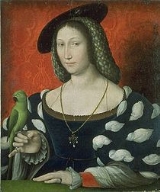
Marguerite de Navarre
Overview
Henry II of Navarre
Henry II was the eldest son of John III of Navarre and Catherine I of Navarre, sister and heiress of Francis Phoebus, King of Navarre; he was born at Sangüesa.-King of Navarre:...
. Her brother became king of France
France
The French Republic , The French Republic , The French Republic , (commonly known as France , is a unitary semi-presidential republic in Western Europe with several overseas territories and islands located on other continents and in the Indian, Pacific, and Atlantic oceans. Metropolitan France...
, as Francis I
Francis I of France
Francis I was King of France from 1515 until his death. During his reign, huge cultural changes took place in France and he has been called France's original Renaissance monarch...
and the two siblings were responsible for the celebrated intellectual and cultural court and salons of their day in France.
Marguerite is the ancestress of the Bourbon kings of France, being the mother of Jeanne d'Albret, whose son, Henry of Navarre, succeeded as Henry IV of France
Henry IV of France
Henry IV , Henri-Quatre, was King of France from 1589 to 1610 and King of Navarre from 1572 to 1610. He was the first monarch of the Bourbon branch of the Capetian dynasty in France....
, the first Bourbon king.
As an author
Author
An author is broadly defined as "the person who originates or gives existence to anything" and that authorship determines responsibility for what is created. Narrowly defined, an author is the originator of any written work.-Legal significance:...
and a patron of humanists and reformers, she was an outstanding figure of the French Renaissance
French Renaissance
French Renaissance is a recent term used to describe a cultural and artistic movement in France from the late 15th century to the early 17th century. It is associated with the pan-European Renaissance that many cultural historians believe originated in northern Italy in the fourteenth century...
.

